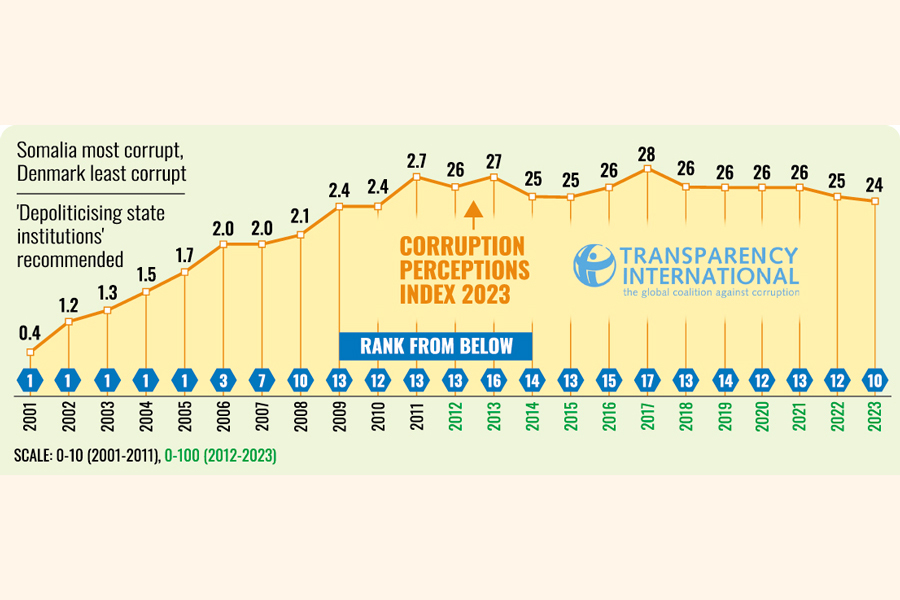
Published :
Updated :

Bangladesh ranking dropped two spots in the global Corruption Perceptions Index (CPI) 2023 compared to the previous one, hitting its lowest score since 2012, for what is cited as lax governance transparency.
Falling to 149th standing among 180 countries, the nation now sits just at the 10th rung from the bottom in corruption prevalence. Its previous rank was 147th, according to Transparency International (TI).
Transparency International Bangladesh (TIB)-the country chapter of the Berlin-Based anti-graft watchdog-revealed this relapse at a press conference at its office in Dhaka on Tuesday, noting that the country's score declined from 26 to 24 out of 100.
Presenting the latest CPI data, Dr Iftekharruzzaman, executive director of TIB, said: "Counting from bottom, Bangladesh is ranked at 10th from below, two steps lower than the 12th-lowest score of 2022."
It is "disappointing and embarrassing" that Bangladesh is among 122 countries that have scored below 50, which means having 'serious corruption problem', he added.
Bangladesh's score is 19 points lower than global average of 43, and the country is classed among 105 countries that have scored below this global average, indicating 'very serious corruption problem'.
The country score (24) remains the 10th-lowest in the world and the 4th-lowest among 31 Asia-Pacific ones-only better than Afghanistan and Cambodia (22), Myanmar (20) and North Korea (17).
Among the eight South Asian countries, Bangladesh stands second in lowest score and rank - better than only Afghanistan, which has scored 20 and ranked 162nd among 184 counties from the top, the TI report reveals.
The country's score in global corruption measure is 21 points less than the average of 45 for the Asia-Pacific region and lower than any other region including the lowest-performing Sub-Saharan Africa (33), according to the report.
The war-torn Somalia has secured the unenviable title of being the most corrupt, scoring a mere 11 points.
Denmark, for a second consecutive year, clinches the top position as the least- corrupt nation, boasting a score of 90 points. Following closely behind are Finland, New Zealand, Norway, and Singapore, rounding up the top five spots.
Bangladesh has performed lower than the average level for countries ruled by the worst-regime types as per Economist Intelligence Unit (EIU) classification and worst-electoral-democracy type as per Freedom House (FH) classification.
"The main message of CPI 2023 is that corruption and injustice are interrelated and feed each other. Corruption breeds injustice, while injustice breeds further corruption, creating the vicious circle," says the international watchdog in its report.
About factors behind Bangladesh's continued disappointing result, the TI says the data period for CPI 2023 witnessed no strategic initiatives to transform the rhetoric of 'zero tolerance' against corruption into practice.
"Widespread public-sector corruption further intensified, especially in public contracting and project implementation," it says, adding that there has been no effective action against "endless" exposures of money laundering.
The TI has found mixed signals in judicial process - "call for action contradicted with lack or freeze of action".
Political and government positions were treated as "licence for abuse of power", it says as a reason for continued disappointing result.
The TI also alleges policy capture for "abuse of lobby power, especially in the banking sector ravaged by loan default and related swindling, financial fraud and money laundering".
The agency suggests challenging impunity effectively and bringing the corrupt, especially the powerful, to justice irrespective of status or identity - being truthful to election manifesto.
It also recommends "depoliticising state institutions" to ensure professional integrity and independence, especially naming ACC, bureaucracy, law-enforcement and judicial service.
Salvaging the strategically crucial sectors of public interest from the clutches of policy capture, conflicts of interest and partisan political influence especially in public procurement, banking, trade, power and energy, health, education, land and infrastructure projects is also underscored for steering clear of the lapses mentioned.
In response to a query, Advocate Sultana Kamal, chairperson of the TIB trustee board, acknowledged government's avowed pledge to combat corruption.
However, she voiced her skepticism, questioning whether this commitment is mere rhetoric or a genuine effort to eradicate corruption.
"We can only hope that government's words translate into concrete actions to eliminate corruption," she told the press meet.
Expressing disappointments, she cited previous instances where the government fell short in fulfilling its promises, such as ensuring a free media and facilitating the flow of information.
"We have witnessed instances where the government's assurances haven't materialised, like in the case of press freedom and access to information," says the TIB board chair.
sajibur@gmail.com


 For all latest news, follow The Financial Express Google News channel.
For all latest news, follow The Financial Express Google News channel.